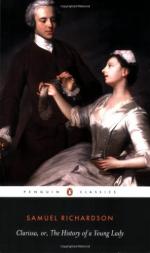She shot to the stairs-head to receive him, and, taking his hand, asked half a dozen questions (without waiting for any answer) in relation to Miss Howe’s health; acknowledging, in high terms, her goodness in sending him to see her, before she set out upon her little journey.
He gave her a letter from that young lady, which she put into her bosom, saying, she would read it by-and-by.
He was visibly shocked to see how ill she looked.
You look at me with concern, Mr. Hickman, said she—O Sir! times are strangely altered with me since I saw you last at my dear Miss Howe’s!— What a cheerful creature was I then!—my heart at rest! my prospects charming! and beloved by every body!—but I will not pain you!
Indeed, Madam, said he, I am grieved for you at my soul.
He turned away his face, with visible grief in it.
Her own eyes glistened: but she turned to each of us, presenting one to the other—him to me, as a gentleman truly deserving to be called so—me to him, as your friend, indeed, [how was I at that instant ashamed of myself!] but, nevertheless, as a man of humanity; detesting my friend’s baseness; and desirous of doing her all manner of good offices.
Mr. Hickman received my civilities with a coldness, which, however, was rather to be expected on your account, than that it deserved exception on mine. And the lady invited us both to breakfast with her in the morning; he being obliged to return the next day.
I left them together, and called upon Mr. Dorrell, my attorney, to consult him upon poor Belton’s affairs; and then went home, and wrote thus far, preparative to what may occur in my breakfasting-visit in the morning.
LETTER XLVIII
Mr. Belford, to Robert Lovelace,
ESQ.
Thursday, July 27.
I went this morning, according to the lady’s invitation, to breakfast, and found Mr. Hickman with her.
A good deal of heaviness and concern hung upon his countenance: but he received me with more respect than he did yesterday; which, I presume, was owing to the lady’s favourable character of me.
He spoke very little; for I suppose they had all their talk out yesterday, and before I came this morning.
By the hints that dropped, I perceived that Miss Howe’s letter gave an account of your interview with her at Col. Ambrose’s—of your professions to Miss Howe; and Miss Howe’s opinion, that marrying you was the only way now left to repair her wrongs.
Mr. Hickman, as I also gathered, had pressed her, in Miss Howe’s name, to let her, on her return from the Isle of Wight, find her at a neighbouring farm-house, where neat apartments would be made ready to receive her. She asked how long it would be before they returned? And he told her, it was proposed to be no more than a fortnight out and in. Upon which she said, she should then perhaps have time to consider of that kind proposal.




